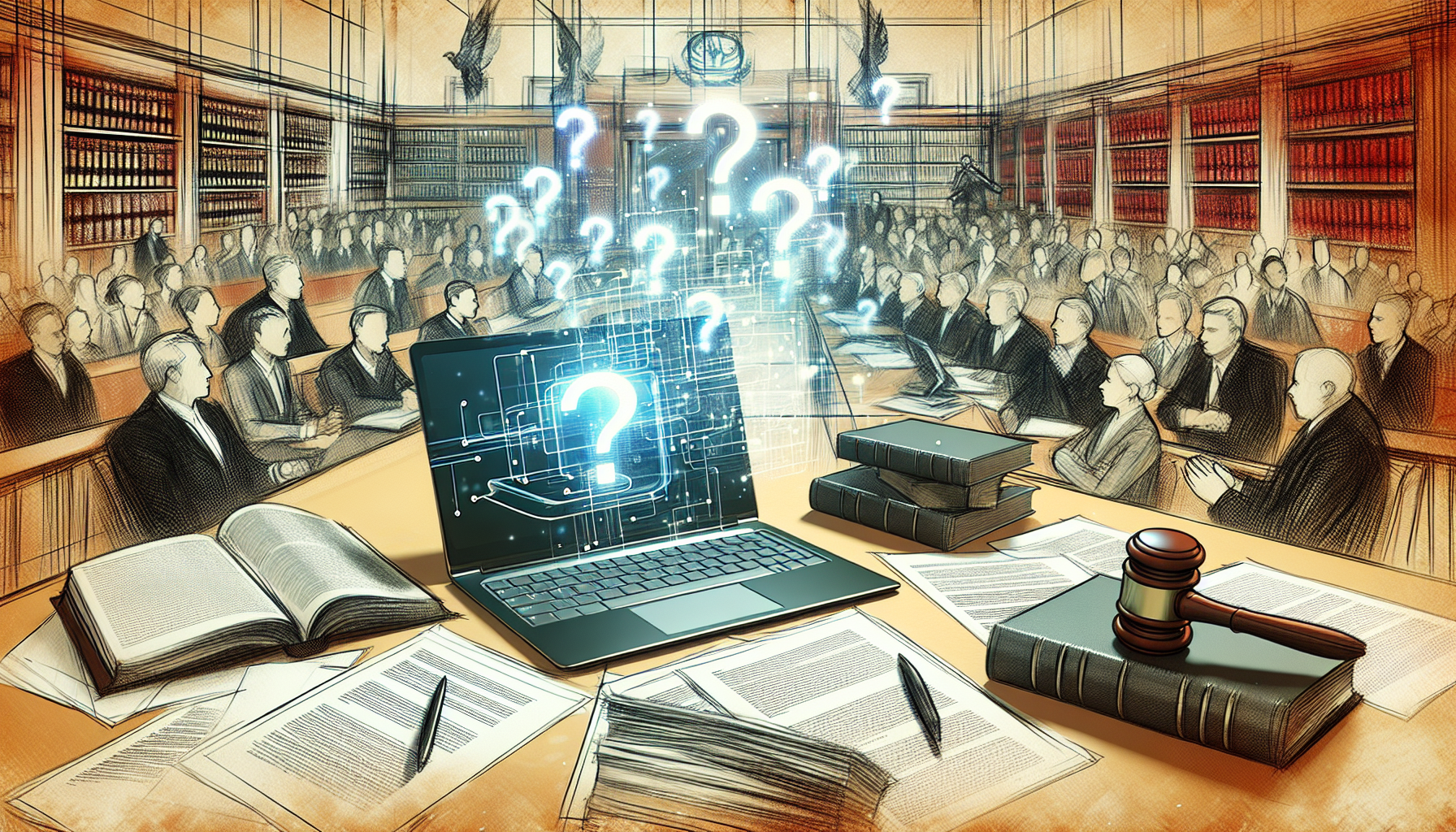
Winning the Time Battle: Introduction
In the fast-paced world of criminal defense, time is an invaluable asset. Attorneys and paralegals often juggle tight deadlines, voluminous case files, and the immense pressure of ensuring justice for their clients. One of the essential skills in this domain is efficient statutory interpretation, as it forms the backbone of arguments and defense strategies. Embracing advanced technologies like ChatGPT can significantly streamline this process, providing timely and accurate legal research capabilities that empower defense teams.
Understanding the importance of statutory interpretation sets the stage for delving into how ChatGPT can revolutionize legal research in criminal defense cases.
The Digital Ally: Role of ChatGPT in Legal Research
ChatGPT, a variant of large language models (LLMs) developed by OpenAI, represents a transformative tool for legal professionals. Equipped with vast amounts of textual data, including legal texts, these models can assist in sifting through statutes, case law, and legal precedents with unprecedented speed and accuracy.
By leveraging ChatGPT, criminal defense lawyers can expedite their research processes. This AI-driven tool can quickly locate relevant statutes, analyze nuanced legal questions, and provide summaries of complex case law, making it an invaluable digital ally in the legal sector.
With a solid understanding of ChatGPT’s capabilities, we can now explore how to customize prompts to maximize its efficacy for statutory interpretation.
Also read:
Parsing the Problem: Customizing Prompts for Statutory Interpretation
Crafting effective and targeted prompts is critical for deriving precise and relevant information from ChatGPT. The specificity of language and context in prompts significantly affects the quality of responses.
- Effective Prompts: An effective prompt should clearly state the legal issue at hand. For instance, “Interpret the term ‘malice aforethought’ as used in section X of the penal code” is more precise than a vague “Explain malice aforethought.”
- Context-Rich Prompts: Incorporating the factual matrix of the case can further refine the output. For example, “Given a scenario where an individual acted in self-defense, how does the statute define ‘malice aforethought’?”
Such nuanced and context-specific prompts enable ChatGPT to provide more insightful and tailored analyses. These refined techniques lead us to explore more advanced strategies for extracting deeper statutory interpretations.
Also read:
In the Weeds: Advanced Techniques for Nuanced Searches
Utilizing context-rich queries and hypothetical scenarios can significantly enhance the depth of statutory interpretations derived from ChatGPT.
- Detailed Interpretations: Instead of a generic query, frame questions that dig into specifics. For example, “Analyze the implications of ‘due diligence’ under section Y of the corporate fraud statute, considering recent amendments.”
- Hypothetical Scenarios: Test the statutory language using various hypothetical situations. For instance, “Under section Z, what would be the legal interpretation if a defendant claims ignorance of the law while committing the offense?”
These strategies enable defense teams to not only understand statutory provisions but also anticipate potential legal arguments and counter-arguments. As we navigate beyond statutory language, the integration of case law and cross-referencing further enriches legal research.
Also read:
Beyond the Black Letter: Cross-Referencing and Case Law
In criminal defense, it’s crucial to harmonize statutory interpretations with relevant case law. ChatGPT can play a pivotal role in cross-referencing statutes and judicial precedents.
By querying ChatGPT with prompts like “Cross-reference section X with relevant case law on self-defense,” attorneys can swiftly gather comprehensive insights. This integration aids in constructing robust legal arguments and understanding how statutes have been historically interpreted by courts.
Employing these techniques ensures a well-rounded approach to legal research, making it essential to also address the ethical considerations associated with relying on AI.
Also read:
The Ethical Compass: Ensuring Accuracy and Reliability
Ensuring the dependability of AI-generated outputs is paramount in legal research. While ChatGPT can provide valuable assistance, it’s crucial to verify the information obtained.
- Verifying Outputs: Always cross-check AI-generated data against authoritative sources such as the latest legal databases and official publications.
- Mitigating Risks: Be aware of AI limitations, including potential biases and reliance on outdated information. Regular updates and validation of data sources are crucial.
Mitigating these risks ensures the accuracy and reliability of legal research outputs. Integrating ChatGPT with established legal research software further enhances efficiency.
Also read:
The Automation Arsenal: Integrating with Legal Research Software
Combining ChatGPT with existing legal research tools can exponentially increase productivity. Legal professionals can seamlessly integrate ChatGPT into software like Westlaw, LexisNexis, and other digital libraries.
- Boosting Efficiency: Automated workflows can streamline tasks such as citation checks, legal memo drafting, and case law annotation.
- Enhanced Capabilities: For example, a query can simultaneously pull statutes from Westlaw and solicit ChatGPT’s interpretations, thereby providing a comprehensive research assistant.
Integrating with research software underscores the synergistic potential of AI tools. Continuous feedback mechanisms can further refine their utility.
Also read:
Skill-Building: Continuous Improvement with Iterative Feedback
Feedback is vital for refining the effectiveness of AI-driven tools like ChatGPT in legal research. Training paralegals and legal assistants to provide iterative feedback can help enhance prompt accuracy and output relevance.
Regular training sessions, coupled with real-world usage scenarios, can significantly improve the utility of AI in statutory interpretation, ensuring a more focused and efficient research process.
With continuous improvement mechanisms in place, legal professionals can leverage AI to gain a competitive edge.
Also read:
The Competitive Edge: Practical Takeaways and Best Practices
Summarizing the discussed techniques, attorneys can incorporate the following best practices to maximize productivity with ChatGPT:
- Craft specific, context-rich prompts for precise statutory interpretations.
- Engage in advanced searches using hypothetical scenarios.
- Cross-reference statutes with relevant case law for comprehensive insights.
- Ensure accuracy and reliability of AI outputs through verification.
- Integrate AI with existing legal research tools for enhanced efficiency.
- Implement iterative feedback to refine AI utility continuously.
These actionable insights position legal professionals to enhance their research capabilities significantly. Looking forward, the future potential of AI in legal research is immense.
Also read:
Legal Research Reimagined: Recap and Future Prospects
In conclusion, the incorporation of AI tools like ChatGPT in legal research offers revolutionary benefits, streamlining statutory interpretation and enhancing overall efficiency. The discussed strategies ensure precise, context-rich, and reliable AI-driven legal research.
As technology evolves, the future of AI in legal research promises even greater advancements. Embracing these innovations today equips criminal defense teams with the tools necessary to navigate the complexities of the legal landscape with assured competence and agility.


